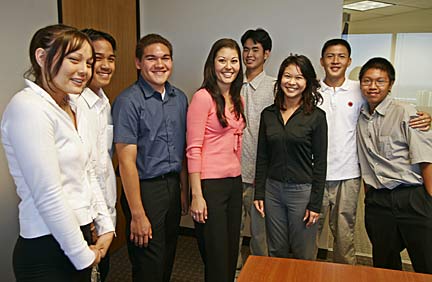|

|
College degree
is no guarantee
into isle boom
Many job-seekers find their
prospects dim despite schooling
After years of working as a waitress, Jennifer Dove was looking forward to graduating from the University of Hawaii this spring so that she could get a better job.
|
|
"I can make more waitressing than I can working in my field" as an educational assistant, Dove said. She plans to return to UH next year to get a master's in library science.
Dove is among the many Hawaii residents who, despite record low unemployment, are still having trouble improving their lot. She has joined a continual string of those who are hedging their bets by holding multiple jobs, going back to school, signing up for continuing training programs or making backup career plans.
Normally, when times are good, higher-learning centers see a decline in enrollment, but that is not the case in this job market, said Mike Rota, associate vice president for academic affairs for the University of Hawaii system.
"It's only dropped about 1 percent from last year. That's a small decline compared to what we've seen in the past, when the job market was good," Rota said. "I think the bad times are still fresh in people's memories, and they are more likely to hedge their bets."
Enrollment at University of Phoenix's Hawaii campus is consistent regardless of the economic cycle in the state, said Robert Gail, director of academic affairs.
"Working adults are interested in going back to school because they realize that they still need a bachelor's or master's degree to succeed and to advance in their career," Gail said.
Job-seekers are more resourceful than they have been in the past, said Pat Nishimoto, a Career Services counselor at the University of Hawaii.
"They know they can't just sit in a rocking chair and expect things to come to them," Nishimoto said.
Many graduates are choosing to go back to school rather than to try and breach Hawaii's job market, no matter how promising it appears, she said.
Even high school graduates are making their decisions with an eye to the future, said Billie Lueder, a career counselor at Kaimuki and McKinley high schools.

These students were part of Cutter's automotive internship program. Graduating from the program were Chanel Taylor, left, Jared Bugarin, Kelly Schalow, Billie Takaki Lueder (transition center coordinator), Kalen Kuniyuki, Trina Sakuma (human resources manager), Lawrence Chan and Danyl Pang.
"I'm hoping an advanced degree will expand my options and help me get an edge on a higher-paying job," Lueder said, adding that she supplements her state income by performing or through freelance writing.
The students Lueder counsels have learned by her example.
Come fall, Lawrence Chan, an 18-year-old McKinley grad, plans to go to pharmacy school at Creighton University in Nebraska. However, he is spending the summer learning to repair cars at Auto Academy, a work/study program sponsored by Cutter Management Co. and First Hawaiian Bank.
Chan is counting on his experience at Auto Academy to supply him with a fallback plan if pharmacy school does not work out.
"There's so much competition right now," Chan said. "People say this is a good job market, but that's crazy talk."
E-mail to City Desk
[News] [Business] [Features] [Sports] [Editorial] [Do It Electric!]
[Classified Ads] [Search] [Subscribe] [Info] [Letter to Editor]
[Feedback]
